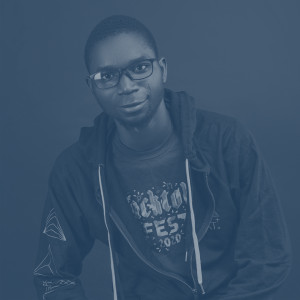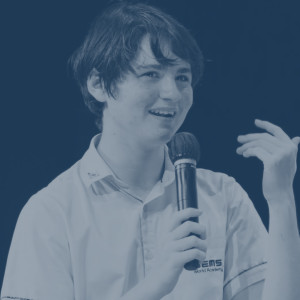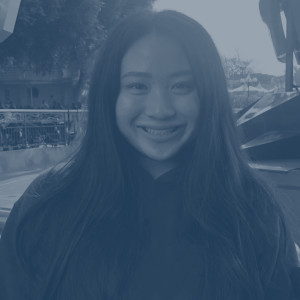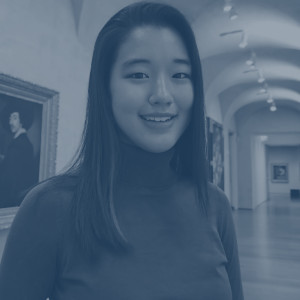Yashika Sharma, 21
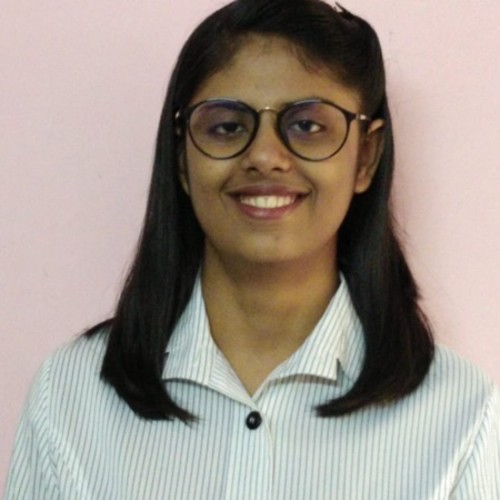
Yashika is grateful to her family for supporting her pursuit of a career in technology, as the vast majority of women in India are not able to pursue what they want, typically being pressured into other fields however we have recently seen positive cultural shifts. She was first interested in computer science engineering only as a means of joining India’s defensive Air Force, as women could only get into defense through a technical degree, but a genuine love for computer science developed as she found supportive tech communities. Despite supporting her dreams, her family was unable to get her the two years of formal coaching needed to attend India’s tier 1 engineering universities which are predominantly male attended. Yashika's family supported her emotionally, and from studying books on her own she managed to get into and attend a tier 3 university. Indian universities don’t have majors, instead, Yashika learned about a variety of topics such as electrical engineering, chemistry, and physics. Barely 25% of students in her classes were womxn and their lacking presence in tech made her feel lost at a time when she needed guidance and mentorship, so Yashika searched for fellow women among the few local tech communities and found the Women Who Code Python club. The club was where she first focused on and found her passion for computer science, as they helped her learn hard coding concepts in an easy way
On top of learning about CS, the club also helped Yashika start to break down the barriers she had been facing as a woman in tech, starting with a fear of public speaking. Yashika could sit and listen to people talk for hours but would faint if someone even so much as called her name from the stage—her fears even stopped her from going to club meetings for a while. Yashika always wished she could jump onto the stage and start speaking, but she was too afraid to try such a bold move. One day she heard a piece of advice, that technical skills are replaceable while soft skills are not, and that made her think hard about giving herself the chance to speak. She asked the Women Who Code Python leaders if she could lead a webinar on NumPy and they said yes, and so she prepared for the event on her own with no real ideas about content length and structure. Delivering the webinar, Yashika lost track of time and went over by 20 minutes, leaving her with no time to answer questions or interact with the audience. She was unhappy with herself because the webinar became less interactive the more she talked, but she was also extremely happy that she talked the whole time and that people stayed and enjoyed the entire session. This was the first of many talks Yashika would come to deliver, and she has since gained enough experience to confidently lead any webinar, conference, or meetup.
By the end of her third year at university, Yashika had joined Omdena as a Machine Learning Engineer, a collaborative coding community for building social-good projects. Omdena showed her the power that a single line of code could have, building projects that saved lives, lowered suicide rates, and decreased teenage crimes; her code made tangible contributions to the world, and having such an impact became her passion in pursuing CS.
Yashika was planning to spend the summer at a CS internship in Pennsylvania when COVID-19 hit. The program was canceled, but in searching for other opportunities Yashika found the MLH Fellowship, applied, and got in! She found the diverse tech community she had always been looking for at MLH, as they made coding a community-based effort by providing her with help, resources, and a positive environment to grow in. The Fellowship helped Yashika gain the skills and experience to contribute to open source, and the experience helped her become who she is today by boosting her confidence and strengthening her toolset. None of her prior internships or community experiences felt as welcoming and supportive as MLH, and so Yashika was incredibly excited after the Fellowship when MLH reached out to invite her back as a Pod Leader. The experience was amazing, as Yashika learned so much about a wide variety of topics by helping Fellows brainstorm and work on their passion projects. Yashika’s job was to ensure that no Fellow was struggling, helping them structure their work and have a good experience, while also honing valuable leadership and organizational skills useful for her future engineering career. She loved her coworkers and the supportive environment of MLH, and is glad to have helped her Fellows gain internships and jobs after the program. Yashika is so grateful for the experience because it helped her feel more confident about not only her tech skills but also her professional and project management skills that she will use in future jobs.
Everything Yashika knows about programming she has learned from communities, mentors, and others in tech who generously invested their time to help uplift newcomers and underrepresented groups in tech. After a year of learning from Women Who Code Python, she became a leader in the group and worked to give back to the community in the same way she was helped through her first year. She also started and led her own machine learning study group to uplift women in tech, where she helped teach enthusiastic women of all ages. The experience of leading a study group led Yashika to pursue more mentoring and public speaking opportunities, giving talks and over 10 webinars in one summer. Yashika also launched NLP and deep-learning, and “Ace technical interviews with Python” study groups with the same intentions of spreading knowledge and creating supportive communities, both successful experiences that reached a diverse group of attendees. She now hosts a monthly Ask Me Anything series where she invites brilliant industry-leading women to talk about their inspirational experiences in tech—listeners often tell Yashika how the talks helped them choose the right paths for their own careers. Communities matter a lot to Yashika, and they are one of few ways to find help in pursuing your own path in India. Even with a supportive family like Yashika has, if they don’t know about your chosen field or understand your work it can still be very hard to forge your own path, which is why the support of tech communities is so important. Yashika wants to see more women join the STEM fields to make a more inclusive environment for female hackers in India.
Every hackathon Yashika attends lets her add a new tool to her tech stack. When she began learning computer science she only had theoretical knowledge, but by building projects at hackathons she got the chance to get her hands dirty and apply her ideas and theories to create a product. Building projects in a limited time span has helped her come up with ideas quickly and stay motivated to finish what she has started. The mentors and other hackers that she meets at events help her improve and stay motivated to keep refining her skills and build a tech repertoire. The connections and network she has forged inspire her and helped her find her career path in machine learning and AI when she felt lost pursuing a variety of tech interests, and they will certainly remain helpful as she pursues her future career.
Yashika is proud of the projects she has made at hackathons and the social good projects she has built. The project she is most proud of is the #sexedPL project, where she used data science to analyze the effects of sex education to reduce teenage crimes, pregnancies, and suicides. She used machine learning and natural language processing to analyze social media posts on multiple platforms to understand what happens in the mind of teenagers. The analysis from the project and report she put together revealed that kids struggle to get the basic sex education that they need and are choose wrong or dangerous behaviors because of that. The report went on to be presented by the community, Omdena, in front of lawmakers of the Poland, and as a result, they are considering enforcing sex education as a mandatory subject in schools.
Coming from a point where she felt lost and without a community to where she can now build an array of projects and help other lost individuals in the hacker community to learn and feel at home, Yashika is proud that she never gave up. She thanks the MLH, Omdena, and Women Who Code Python communities for giving her a chance to meet people like herself in tech, for helping her learn through experience, and for helping her grow into the person she is today.
Quick Facts
Yashika Sharma, 21

Yashika is grateful to her family for supporting her pursuit of a career in technology, as the vast majority of women in India are not able to pursue what they want, typically being pressured into other fields however we have recently seen positive cultural shifts. She was first interested in computer science engineering only as a means of joining India’s defensive Air Force, as women could only get into defense through a technical degree, but a genuine love for computer science developed as she found supportive tech communities. Despite supporting her dreams, her family was unable to get her the two years of formal coaching needed to attend India’s tier 1 engineering universities which are predominantly male attended. Yashika's family supported her emotionally, and from studying books on her own she managed to get into and attend a tier 3 university. Indian universities don’t have majors, instead, Yashika learned about a variety of topics such as electrical engineering, chemistry, and physics. Barely 25% of students in her classes were womxn and their lacking presence in tech made her feel lost at a time when she needed guidance and mentorship, so Yashika searched for fellow women among the few local tech communities and found the Women Who Code Python club. The club was where she first focused on and found her passion for computer science, as they helped her learn hard coding concepts in an easy way
On top of learning about CS, the club also helped Yashika start to break down the barriers she had been facing as a woman in tech, starting with a fear of public speaking. Yashika could sit and listen to people talk for hours but would faint if someone even so much as called her name from the stage—her fears even stopped her from going to club meetings for a while. Yashika always wished she could jump onto the stage and start speaking, but she was too afraid to try such a bold move. One day she heard a piece of advice, that technical skills are replaceable while soft skills are not, and that made her think hard about giving herself the chance to speak. She asked the Women Who Code Python leaders if she could lead a webinar on NumPy and they said yes, and so she prepared for the event on her own with no real ideas about content length and structure. Delivering the webinar, Yashika lost track of time and went over by 20 minutes, leaving her with no time to answer questions or interact with the audience. She was unhappy with herself because the webinar became less interactive the more she talked, but she was also extremely happy that she talked the whole time and that people stayed and enjoyed the entire session. This was the first of many talks Yashika would come to deliver, and she has since gained enough experience to confidently lead any webinar, conference, or meetup.
By the end of her third year at university, Yashika had joined Omdena as a Machine Learning Engineer, a collaborative coding community for building social-good projects. Omdena showed her the power that a single line of code could have, building projects that saved lives, lowered suicide rates, and decreased teenage crimes; her code made tangible contributions to the world, and having such an impact became her passion in pursuing CS.
Yashika was planning to spend the summer at a CS internship in Pennsylvania when COVID-19 hit. The program was canceled, but in searching for other opportunities Yashika found the MLH Fellowship, applied, and got in! She found the diverse tech community she had always been looking for at MLH, as they made coding a community-based effort by providing her with help, resources, and a positive environment to grow in. The Fellowship helped Yashika gain the skills and experience to contribute to open source, and the experience helped her become who she is today by boosting her confidence and strengthening her toolset. None of her prior internships or community experiences felt as welcoming and supportive as MLH, and so Yashika was incredibly excited after the Fellowship when MLH reached out to invite her back as a Pod Leader. The experience was amazing, as Yashika learned so much about a wide variety of topics by helping Fellows brainstorm and work on their passion projects. Yashika’s job was to ensure that no Fellow was struggling, helping them structure their work and have a good experience, while also honing valuable leadership and organizational skills useful for her future engineering career. She loved her coworkers and the supportive environment of MLH, and is glad to have helped her Fellows gain internships and jobs after the program. Yashika is so grateful for the experience because it helped her feel more confident about not only her tech skills but also her professional and project management skills that she will use in future jobs.
Everything Yashika knows about programming she has learned from communities, mentors, and others in tech who generously invested their time to help uplift newcomers and underrepresented groups in tech. After a year of learning from Women Who Code Python, she became a leader in the group and worked to give back to the community in the same way she was helped through her first year. She also started and led her own machine learning study group to uplift women in tech, where she helped teach enthusiastic women of all ages. The experience of leading a study group led Yashika to pursue more mentoring and public speaking opportunities, giving talks and over 10 webinars in one summer. Yashika also launched NLP and deep-learning, and “Ace technical interviews with Python” study groups with the same intentions of spreading knowledge and creating supportive communities, both successful experiences that reached a diverse group of attendees. She now hosts a monthly Ask Me Anything series where she invites brilliant industry-leading women to talk about their inspirational experiences in tech—listeners often tell Yashika how the talks helped them choose the right paths for their own careers. Communities matter a lot to Yashika, and they are one of few ways to find help in pursuing your own path in India. Even with a supportive family like Yashika has, if they don’t know about your chosen field or understand your work it can still be very hard to forge your own path, which is why the support of tech communities is so important. Yashika wants to see more women join the STEM fields to make a more inclusive environment for female hackers in India.
Every hackathon Yashika attends lets her add a new tool to her tech stack. When she began learning computer science she only had theoretical knowledge, but by building projects at hackathons she got the chance to get her hands dirty and apply her ideas and theories to create a product. Building projects in a limited time span has helped her come up with ideas quickly and stay motivated to finish what she has started. The mentors and other hackers that she meets at events help her improve and stay motivated to keep refining her skills and build a tech repertoire. The connections and network she has forged inspire her and helped her find her career path in machine learning and AI when she felt lost pursuing a variety of tech interests, and they will certainly remain helpful as she pursues her future career.
Yashika is proud of the projects she has made at hackathons and the social good projects she has built. The project she is most proud of is the #sexedPL project, where she used data science to analyze the effects of sex education to reduce teenage crimes, pregnancies, and suicides. She used machine learning and natural language processing to analyze social media posts on multiple platforms to understand what happens in the mind of teenagers. The analysis from the project and report she put together revealed that kids struggle to get the basic sex education that they need and are choose wrong or dangerous behaviors because of that. The report went on to be presented by the community, Omdena, in front of lawmakers of the Poland, and as a result, they are considering enforcing sex education as a mandatory subject in schools.
Coming from a point where she felt lost and without a community to where she can now build an array of projects and help other lost individuals in the hacker community to learn and feel at home, Yashika is proud that she never gave up. She thanks the MLH, Omdena, and Women Who Code Python communities for giving her a chance to meet people like herself in tech, for helping her learn through experience, and for helping her grow into the person she is today.
